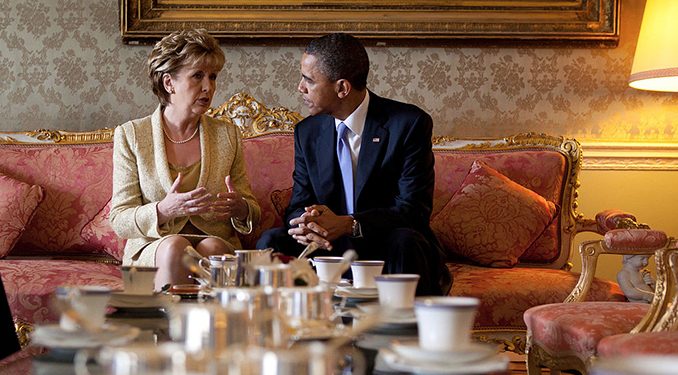
Mary McAleese, a former president of Ireland who, like many Catholic politicians these days, seems to maintain a rambunctious relationship with Church, recently gave a speech alleging hypocrisy by the Holy See concerning its commitment to the rights of children. I have not read the Vatican statements that attracted McAleese’s ire, but I am acquainted with the 1983 Code of Canon Law, including its canons on “legitimacy” (in regard to children born in or out of wedlock), on which canons McAleese commented. I fear, though, that McAleese, who claims credentials in canon law herself, misrepresented Church law in this area during her remarks.
Although from this report it is not clear what McAleese actually said about whatever the Vatican actually said, if the Vatican claimed that the word “illegitimate” does not appear in the Catechism of the Catholic Church, the Vatican would have been correct (yawn); if the Vatican claimed that the word “illegitimate” does not appear in the 1983 Code, any high-schooler with internet access could have disproven the claim—making me think that someone, somewhere does not have this part of the story straight.
But whatever might be the case about that point, McAleese’s bald claim that “canon law does not acknowledge the equality of legitimate and illegitimate children” arrests my attention. How can a legally astute, former president of an important country, equipped with a graduate degree in canon law, make such a completely wrong claim about canon law?
More than thirty years ago the Johanno-Pauline Code removed all, repeat all, of the canonical disabilities that being born out of wedlock had carried under the 1917 Code—things such as restrictions on entering seminary or being named a religious superior or bishop. Today, codified canon law, which does indeed reference legitimacy and illegitimacy in a few canons, imposes no restrictions whatsoever on those born out of wedlock. The splendid canonical commentary prepared by the Canon Law Society of Great Britain and Ireland expressly makes this point (Letter & Spirit, 1985, p. 641). McAleese surely knows this work, so how did she arrive at exactly the opposite conclusion?
One could, I suppose, ask why “legitimacy” is even mentioned in modern canon law; indeed, the whole topic was nearly dropped from the revised law.
But I would suggest that various considerations might well warrant the Code giving some directions to pastors about, say, entering names in baptismal registers when the children being christened were not born to married parents (as does, e.g., 1983 CIC 877). Moreover, other canonical commentaries (e.g., the American text of 2001 at p. 1358) note that some states might, perhaps in virtue of concordats with the Holy See, accord civil consequences to canonical marriage law and so such questions issues needed to be addressed somewhere. But in such cases, would not the example of the equal treatment accorded by canon law to all children, whether born inside or outside of wedlock, redound to their civil benefit as well?
But perhaps McAleese’s main point is that illegitimacy is an opprobrious term and that children should be spared as much as possible the negative consequences of their parents’ actions. If so, fine. That’s what I said in my book, Annulments and the Catholic Church, a dozen years ago at pp. 90-91 and I am hardly a revolutionary for making that point. But then, neither is McAleese.
In short, someone decrying discrimination against children based on the circumstances of their birth is making a good point, but he or she cannot plausibly accuse modern canon law of fomenting said discrimination.
Not when exactly the opposite is true.
(This post originally appeared on the “In the Light of the Law” blog and is reposted here by kind permission of Dr. Peters.)
If you value the news and views Catholic World Report provides, please consider donating to support our efforts. Your contribution will help us continue to make CWR available to all readers worldwide for free, without a subscription. Thank you for your generosity!
Click here for more information on donating to CWR. Click here to sign up for our newsletter.







On, please.
McAleese has proved herself to be a CINO pretty much anytime she has written or spoke on Catholic morality. Look at her tenure as president.
This was not in error.
The duty of care falls to her local Bishop and if he refuses the duty of care falls to the Pope.
it is important to note that to deny the Sanctity of human life from the moment of conception and/or the Sanctity of marriage and the marital act, is to deny that God Is The Author of Love, of Life, and of Marriage, and thus deny Salvational Love, God’s Gift of Grace and Mercy. Is not this sin, The Sin Against The Holy Ghost and are we in the midst of a Great Apostasy?
Now who’s going to tell ex-Prez McAleese?
Americans may not know that Ireland has a parliamentary system of government, modelled on the British one. The President has a merely ceremonial role with almost no real power. They may refrain from signing legislation and refer it to a Council of Seate. In theory, they appoint the Prime MInister, but not in reality as he needs to have a majority in the parliament before being nominated. The President of Ireland makes foreign trips, inaugurates bridges and such and little more. As for McAleese, it is no surprise to me that her knowledge of Canon Law is scant, as he studied it based on ideology in an attempt to use it against the Church.
Canon Law quite reasonably took legitimacy into consideration in the past (when various nobles, especially, sought to place illegitimate offspring in ecclesiastical offices); I myself could have been affected, had I thought I had a religious vocation when I was young. In the 20th and 21st Centuries, however, this ceased to be a concern.